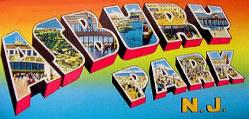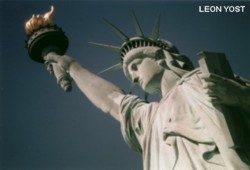 |  |  |
|
| ||
 |  |  |
 |  |  |
|
| ||
 |  |  |

Originally appeared in the Bergen Record on Saturday, March 24, 2001
Acting Gov. Donald T. DiFrancesco netted $106,000 over the past two years by buying and quickly trading stocks in primarily Internet and biotechnology companies that went public for the first time, according to documents released by the governor's office Friday.
Between 1999 and 2000, DiFrancesco's broker bought 25 stocks through initial public offerings and sold them in two days or less at a profit, a technique that has come to be known as "flipping."
In one transaction in October 1999, DiFrancesco paid $3,800 for 100 shares in Sycamore Networks Inc., a Massachusetts-based company that develops network software. He sold them the next day for $19,890, a 423 percent profit.
The stock transactions were detailed in federal tax returns for DiFrancesco and his wife Diana, which were part of an extensive package of financial and legal documents that DiFrancesco made public Friday afternoon.
In addition to seven years of federal returns, DiFrancesco made available his state income tax returns, a list of clients that his law firm has represented, and summaries of lawsuits in which he was named as a defendant.
DiFrancesco called it the "most comprehensive and complete disclosure" ever made by a candidate in New Jersey. DiFrancesco is seeking the Republican nomination to run for a full term as governor this fall.
"What I am releasing today is everything that I know has been requested by my opponents' opposition researchers as well as the press," he said in a statement released through the governor's office.
"I am also hopeful that my opponents will join with me in voluntarily making this level of disclosure so that we can all move beyond this and get on with debating real issues," he added.
Democrats accused DiFrancesco of conducting campaign work on government time and demanded that his campaign reimburse the state for the cost of preparing the information.
But DiFrancesco spokesman Tom Wilson said the work was appropriate, given the unusual circumstances of DiFrancesco's rise to the governor's office. He succeeded former Gov. Christie Whitman in January after she resigned to head the U.S. Environmental Protection Agency.
"Most people who become governor do so by winning a campaign where those issues are raised and dispensed with," Wilson said. "That is why most candidates make those disclosures. This governor became governor in a different route. That doesn't change the level of confidence that he wants people to have in him."
The DiFrancescos had mixed success in the stock market before reaping windfalls from the IPOs during the last two years. After posting capital gains of $18,006 in 1997 and a capital loss of $3,000 in 1998, they made $93,726 in 1999 and $90,350 last year. Those gains included both short-term profits from IPOs and long-term gains from stocks.
The initial public offerings of a new company are highly coveted by investors. Those fortunate to learn of them often sell their shares quickly, sometimes on the same day, when the price climbs in the first round of trading.
Wilson said all but one of the purchases of IPO stock were made by the DiFrancescos' broker from Morgan Stanley Dean Witter, whom he declined to name.
Wilson said the broker had free rein to make the trades on behalf of the DiFrancescos, who often did not know of the trade until long after they were made.
One IPO DiFrancesco did not get into through the broker was Net2Phone, the Newark-based Internet communications company whose president is Clifford Sobel, finance chairman of the Republican State Committee. Wilson said Sobel invited DiFrancesco in on the IPO.
Unlike most other IPOs, which he held two days or less, DiFrancesco let his $15,000 investment in Net2Phone ride for 11 days before he sold it for $20,870, or a 39 percent profit.
DiFrancesco also invested $25,000 in December 1997 in Glimcher Realty, a company that developed the Jersey Gardens Mall in Elizabeth with the help of state subsidies and favorable legislation that financed highway access. He sold it in January 1998 for only a $26 profit, however.
Wilson said he did not know why DiFrancesco made the investment in Glimcher or whether there was anything unethical about the transaction.
DiFrancesco released tax returns dating back to 1994, the year four longtime friends and a family member bailed him out of a troubled real estate investment in Chatham, Wilson said.
Among those lending him money were two people DiFrancesco recommended for highly coveted state posts. DiFrancesco has denied any link between the loans and the recommendations.
Wilson said DiFrancesco chose to release information from that year to reassure residents that it was a "legitimate business transaction." Tax returns for 1994 show that DiFrancesco declared the interest he paid on the loans that allowed him to forestall a foreclosure on the property.
The DiFrancescos' adjusted gross income fluctuated from a low of $430,501 in 1998 to a high of $576,370 in 1997, and the couple paid on average about 34 percent in state and federal taxes combined.
Donald DiFrancesco was the principal breadwinner in the family, collecting an annual salary of $289,000 from his Warren Township law firm, in which he sold his interest earlier this year before becoming acting governor. He also earned $44,000 annually from the Legislature, where he received a bonus for serving as Senate president. Through 1998, he earned about $31,000 annually from Scotch Plains, where he served as township attorney. Diane DiFrancesco works as an insurance agent.
The DiFrancescos gave $14,294 last year to charitable organizations ranging from church groups and the Make-a-Wish Foundation to Donald DiFrancesco's alma mater, Penn State University.
DiFrancesco also released documents showing he was the passenger in a vehicle that struck and killed an elderly Warren Township man on Dec. 26, 1992. The driver of the vehicle was John Coley, DiFrancesco's law partner.
By CHARLES STILE
and HERB JACKSON
Trenton Bureau
 Your Ancestors' Story |
 Bruce Springsteen's Jersey Shore Rock Haven! |

|
UrbanTimes.com |